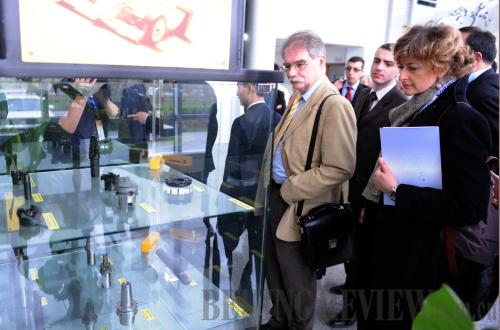|
 |
|
HIGH-END MANUFACTURING: Potential overseas investors visit the Tianjin subsidiary of U.S.-based Kenametal Inc. (LIU HAIFENG) |
Multinational companies are expecting a more receptive environment for their investments in China, especially if those investments go to emerging industries, help with development efforts in central and west China, or facilitate reorganization and restructuring of Chinese enterprises.
In the latest guidelines for foreign investments—released by the State Council, China's cabinet, on April 14—China is reassuring multinational companies it will continue to improve the environment for foreign direct investments (FDI) amid their mounting apprehensions over the country's changing business climate.
The guidelines propose five improvements: optimizing industrial distribution of FDI, encouraging central- and west-China bound FDI, promoting diversified investment patterns of FDI, further reforming the FDI management system, and creating an FDI friendly environment.
"The regulation looks similar to last December's five points to encourage foreign investments, but it offers some detailed solutions and addresses technical problems," He Manqing, Deputy Director of the Transnational Corporation Research Center under the Ministry of Commerce (MOFCOM), told the National Business Daily.
Decoding the guidelines
The guidelines will make China's policies related to attracting, guiding and supervising FDI more feasible and sustainable, said He.
For example, the guidelines pledge to exempt qualified foreign-funded R&D centers from paying import taxes, value-added taxes and consumer taxes for R&D-related imports to encourage multinational companies to establish regional headquarters, R&D centers and purchasing centers in China.
Li Shouchuang, senior partner of Dacheng Law Offices, said in an online article for the Financial Times that the guidelines send two important messages: China is about to ease up restrictions and give foreign-funded companies national treatment; and China wants foreign investment to serve its top economic development priorities.
National treatment means foreign investors will no longer enjoy special preferential treatment, but will see the gradual elimination of restrictions on their businesses, said Vice Minister of MOFCOM Ma Xiuhong.
By industrial distribution optimization, China will steer foreign investments into high-end manufacturing, hi-tech, modern service, new energy and environmentally friendly industries, said Zhang Xiaoqiang, Vice Minister of the National Development and Reform Commission.
"We will no longer welcome foreign investments in energy-demanding, pollution-ridden industries and industries with overcapacity, but we will keep the door open for technology-intensive and service-oriented investments and those that will make full use of China's labor market competitiveness," he said. "China is no more the 'factory of the world' where growth is achieved by high-energy consuming, heavy-polluting and resource-driven industries. It's not unsustainable."
Last year, China contributed to 8 percent of the world's total GDP at the cost of 18 percent of energy, 44 percent of steel and 53 percent of cement consumption the world over.
In addition to the guidelines, China will revise the Catalogue for the Guidance of Foreign Investment Industries this year in accordance with the country's commitments to a low-carbon economy.
It will be the fifth revision to the catalogue, issued in 1995, as a response to the country's industrial restructuring and growth model shift currently underway, Zhang said.
The guidelines also propose improvements to the geographical distribution of FDI in China. A similar catalogue for central and west China will be amended to encourage foreign investors to develop labor-intensive and environmentally friendly industries in these less developed regions.
| 